Transforming lives through innovation
Year in Review



In a role that requires me to always look forward, pausing to look back gives an opportunity to reflect on what has gone well, and what we must do better. The Kent Surrey and Sussex Academic Health Science Network (KSS AHSN) wants to serve its central commission well and be a good member of the national network of AHSNs. It strives to add value to the lives of 4.8 million people living in the region, and to the health and care, industry and academic, voluntary and charitable sectors. This is where we champion innovation.
The last year has been pivotal. Population health and inequality have been major themes within our commissions. This is welcome – innovation must help everyone, not just those who are traditionally well served. We are delighted that in partnership with us, all three Integrated Care Systems (ICSs) that we work with accessed funding for Inequalities in Health Programmes, and that all three include cardiovascular disease prevention.
Building on another brilliant year of supporting industry and economic growth we have learned how to occupy the ground between discovery and care delivery. The AHSN:ARC Implementation Panel facilitates health and care leads from our ICSs to influence the questions that are researched.
You’ll discover in this report that most of our nationally commissioned programmes have gone well, with good support from clinical networks and primary care. For the small number that haven’t gone as well, we know why, allowing us to set risk and plan better. I also welcome the decision by regional NHS England, and by our three ICS chief officers, to take a partnership approach to our assurance, covering the breadth and depth of work we do. Finally, I want to acknowledge and thank my team for the hard work, creativity and sensitivity they each demonstrate. Thank you.
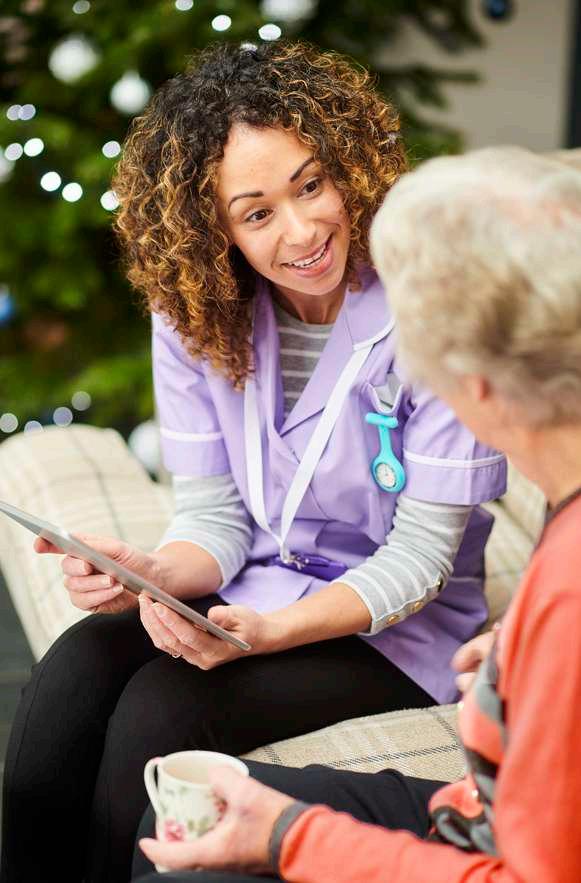 Des Holden Chief Executive Officer
Des Holden Chief Executive Officer

I have become the Chair of KSS AHSN – soon to be the Health Innovation Network for Kent, Surrey and Sussex –at a challenging but exciting time. As we look ahead to embark on our new fiveyear licence, I wish to pay tribute to my predecessor as Chair, David ClaytonSmith, for his ten years of dedicated and highly effective service. He is a very hard act to follow, but I commit to drive the organisation forward to support our local Integrated Care Systems (ICSs) to be as efficient and effective as possible.
We have an outstanding team, which shares my commitment, with the depth and strength of skills and experience needed to build on and amplify our impact. This review shows how much work our staff have done to engage with people and communities who are often hardest to reach. We will continue to build on our women’s health strategy and artificial intelligence initiatives to ensure that health gains for some are not at the expense of others.
We must build partnerships outside of traditional healthcare providers, empowering communities to optimise their health and wellbeing.
With our successful spin-off company, Unity Insights, we will continue to draw upon their analytics capabilities to support our ICSs to bring innovation to life within their areas.
 Jane Ollis Chair
Jane Ollis Chair

Before reflecting on the last year, it’s important to recognise where we are now and where the last year has taken the organisation’s strategy. While developing our strategy, we have looked forward not just to the year ahead, but to the next three to five years. We have consulted with ICS and other colleagues to fully understand local needs. We intend to build on our strengths, which means continued growth of our innovation portfolio, investment in needs articulation, a more targeted approach to industry engagement, and spreading innovation into practice. A key theme for all our work is to seek to narrow rather than widen health inequalities through all we do. We also want to develop new channels for bringing innovation to the public through investing in business development and forging new partnerships. And we will deliver on the requirement to provide a 50/50 national vs. local split on our projects, driving efficiencies by working closely with Wessex and Oxford AHSNs.
Our strategy of thinking beyond acute health (illness treating) providers to out of hospital care, to mental as well as physical health, and to health and social care as well as medical has been refreshed post pandemic. We understand the skills and experience we have, and the service offers we are confident we can make. Some of these build on traditional successes, like spread and adoption, and adding economic value by working with SMEs (Small and Medium Enterprises). Some have been successful but we haven’t done enough of them, or turned them into outputs, like needs articulation and co-design.
Our vision is to work in our health and care systems as an innovation leader, developing a shared purpose and aspiration to address the social determinants of health and wellbeing by listening to people to create better and fairer health outcomes across our communities.
Our service offer themes are illustrated on the next page.
Actively listening to people and local populations
Addressing unmet needs in the community through innovation collaboratives
Translating innovative solutions into practice and accelerating the use of digital tech and Al
Creating clinical and professional networks to improve safety culture and promote innovation
‘Join the dots’
Creating and sustaining intersector partnerships in health and social care
Shaping strong and successful research partnerships
Articulating needs to industry and providing support to innovators
Enabling data analysis and evaluation activities
Contributing to local growth and supporting a vibrant labour market
You’ll see in this report that we’ve achieved a great deal in 2022-23 across national NHS programmes and intend to continue this in the coming years.
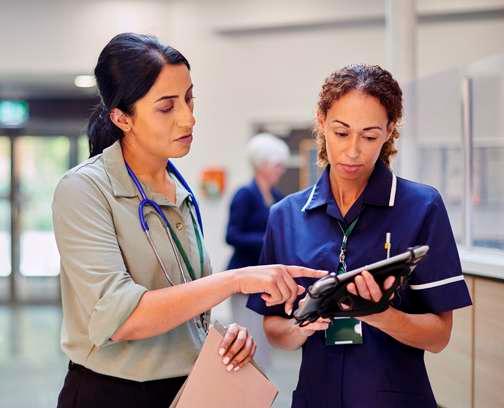
We will take a structured, focused, and pragmatic approach to the spread and adoption of well evidenced innovations, technologies, quality, and safety programmes to improve clinical outcomes, improve patient experience, reduce care costs, and stimulate wealth creation.
We will spread the best new innovations and initiatives to hard-to-reach groups through clinical engagement and by aligning our work with local and regional priorities.
The Applied Research Collaboration (ARC) remains a core pillar of our support to local systems, and we will expand its impact by investing in a new research and innovation post to enable ‘pull’ through the system.
Through our work to deploy innovation into care pathways, we are committed to reducing inequalities in access and outcomes.
We will undertake health inequalities impact analyses on core elements of our portfolio, with a particular focus on women’s health. Digital and A.I.
Harnessing the growing power of digital and AI solutions is fundamental to achieving the ambitions in the NHS Operating Planning Guidance and Life Sciences Vision. We are committed to using our expertise in this field.
“Transformation in digital, data and AI is pivotal in helping to overcome the challenges the NHS faces today and the opportunities it holds for tomorrow. Whilst we continue to engage with innovators with these capabilities, we are also fortunate to support the development of Sussex and Kent and Medway Secure Data Environment, particularly in terms of relationships with industry. We have also been able to convene a clinical reference group to build the semantic layer under Sussex’s Integrated Dataset, and are moving into the exciting territory of population health predictive analytics to better understand and predict healthcare outcomes for citizens.”
Dr Hatim Abdulhussein, Medical DirectorIf innovation is to succeed, it must be developed in collaboration with those who will use or benefit from it. PPIE will continue to grow in importance in our region and across the AHSN Network.
In line with the national AHSN Network pledges, our local business plan focuses on the following areas:
� Reducing the carbon footprint and environmental impact of our own organisation and our programmes of work
� Encouraging innovators, SMEs and industry to consider the impact of their innovations and support the push to net zero
� Supporting the spread of innovations with a positive impact on the environment into the NHS
� Spreading good practice and brokering relationships across other sectors for the benefit of health and care systems.
The way we manage our projects and organisation is informed by our goals: to spread well evidenced innovation into practice, manage the health and social care innovation pipeline, and build the region’s innovation and research system.

Our executive management group (EMG) will continue to oversee delivery activity, reporting to the Board. New Associate Director appointments now form a wider membership of our senior leadership team (SLT).
Risks continue to be managed through our corporate risk register. A major corporate risk relates to the re-licensing of AHSNs as Health Innovation Networks and uncertainty over future budgets from core commissions. In mitigation, we will focus more on serving local ICSs’ and communities.

Throughout 2022-23, we have worked in close partnership with the three Integrated Care Systems we serve: Kent and Medway, Sussex Health and Care, and Surrey Heartlands Health and Care Partnership.
Over the past year they have become fully established to improve outcomes in population health and healthcare, tackle inequalities in outcomes, experience and access, improve productivity and value for money, and contribute to broader social and economic development.
In the future, we aim to become more involved in ICS strategic and operational discussions in order to work better together.
Examples of the impact of our work across the three ICSs are included throughout this report, but to highlight a few:
Our close relationship with colleagues across the system has given us valuable insights into the challenges they face. We have supported all parts of the system by making connections to solve problems, and finding and implementing well-evidenced, beneficial and good value innovations to improve health and wellbeing for all our citizens.
In Kent and Medway, KSS AHSN is pleased to have contributed to ICS objectives. We did this through supporting GP practices to address lipid optimisation in 20% of the most deprived communities, enabling a cross-sector partnership bid to tackle opioid overdose and drug deaths, articulating research and innovation ambitions within the ICS strategy, establishing a Primary Care Innovation Panel, and supporting capacity and capability building through innovation training at Kent Community Health NHS Foundation Trust. These efforts aimed to lead transformation underpinned by data and technology, address health inequalities, and enhance adoption of innovative ideas in primary care.
In Sussex Health and Care, KSS AHSN is pleased to have contributed to multiple Integrated Care System objectives during 2022/23. As with Kent and Medway we did this through supporting GP practices to address lipid optimisation in 20% most deprived communities. We also enabled evaluations of innovations supporting patients in primary care to self-manage their cardiovascular conditions and clinicians to monitor and manage patients remotely, and we supported capacity and capability building through digital innovation training at University Hospitals Sussex and Sussex Community NHS Foundation Trust. We’re also delighted to be working with Sussex ICS to respond to the 2022 Women’s Health Strategy for England and set up an Equity Fellowship in 2023/24.
In Surrey Heartlands, we are pleased to have been able to support delivery against the system priorities and particularly respond to the recommendations of the Fuller stocktake report. We have worked hard on important programmes such as cardiovascular disease (CVD) to turn the dial in diagnosing patients with atrial fibrillation (AF) and hypertension. Our innovation panels with Primary Care have enabled us to help teams think differently about new ways of working, such as the adoption of Robotic Processing Automation, to support medicines optimisation. We developed and delivered a Children and Young People’s Innovation Roadshow and worked with the Royal Surrey Hospitals NHS Foundation Trust to provide support and real-world evaluation of local innovator, Leo Cancer Care.
In 22/23 we re-structured our team to serve local delivery requirements better. We have created tailored virtual ICS facing teams which will enable us to be even more responsive to the different challenges ICSs face when providing care for different demographics. Our staff have wide-ranging experience and expertise, including senior clinical and managerial roles in the NHS and social care, academic research, and commercial and business development. Over the past year they have worked on a wide variety of projects, from pathway redesign and evaluation to co-design methodologies and tailored innovator support.
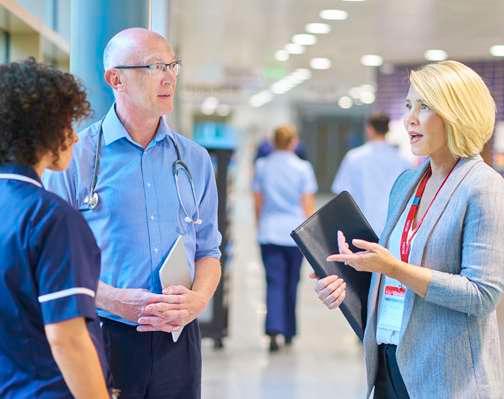
“We continue to deliver high impact work which aligns and is mapped to the regional and system priorities to support innovation and improve population health. We have worked with the three integrated care systems across Kent, Sussex, and Surrey to help them identify, evaluate and adoption innovation, focusing on specific areas including cancer and early diagnosis, cardiovascular, mental health, respiratory, maternity, elective recovery, and early discharge.”
Lisa James, Associate Director, Strategic, Innovation & AssuranceThroughout the past year, our programmes have contributed to at least one of our overarching success factors:

We supported the spread and adoption of the QbTest to 15 sites across the region. Developed by Qbtech Ltd, it provides an objective measure of three areas associated with ADHD, with research indicating that it reduces the average time to obtain a diagnosis by 153 days. Since April 2022, 1,816 children have used Qbtest to help inform their diagnosis for ADHD. This has led to a 19% release of clinical time in paediatrics, 9.2% in CAMHS and a reduction of 22% in nurse school observations.
FeNO is a non-invasive test to measure the amount of nitric oxide in an exhaled breath, a biomarker for airway inflammation. It contributes to faster, and more effective asthma diagnosis and can monitor patient response to asthma treatments.
Between April 2021 and February 2023, 51 devices were spread across Kent, Surrey and Sussex benefitting c. 4,000 patients and preventing 1,450 false positive diagnoses –an equivalent saving of £420,380 a year.
We secured the adoption of new digital tools in 627 care homes in our region, including electronic patient record and assessment proformas used on tablets (such as iPads) to speed up the assessment and referral processes. These tools and a new training programme help care home staff to support elderly residents when their health deteriorates. We anticipate this will reduce the number of 999 calls and emergency hospital admissions.
Our programme takes a Population Health Management (PHM) approach to support the region’s Integrated Care Systems (ICSs) with a focus on improving cardiovascular health. This is achieved through data driven planning and delivery of lipid optimisation care.
We have evidenced that all KSS practices are adopting the NICE endorsed lipid management pathway and patients are benefitting. All three KSS Integrated Care Boards (ICBs) secured InHIP funding to focus on lipid optimisation in targeted populations, with Inclisiran and Bempedoic acid being the NICE approved treatments that the intervention should focus on.
Our Innovation exchange enables vibrant growth across the region we serve.
Over the last year we have contributed:
£34m in economic growth for UK Plc
39.6 jobs safeguarded
60.6 jobs created
Around 1.2m people are waiting for mental health support in the UK, costing an approximate £117bn to UK economy.
Dr Julian provides online and video therapy using trained therapists who support patients remotely, thereby helping the public in the face of capacity constraints within service providers.

KSS AHSN helped the company with a health economic model as part of our Innovation Exchange’s real-world validation offer. We also helped the company’s successful bid for SBRI Healthcare funding.
The service provides:
� £2.83 return for every £1 spent over five years
� 3.4 more appointments for high intensity services compared to mainstream NHS services
� A 50.9% reduction in patients not attending their appointments.
“Through our national NHS England commissions we are delivering multiple programmes that have accelerated access to well-evidenced innovations for patients that transform lives. Through both the MedTech Funding Mandate and Innovation for Healthcare Inequalities Programme we have seen benefits to patients across each ICS in KSS.”
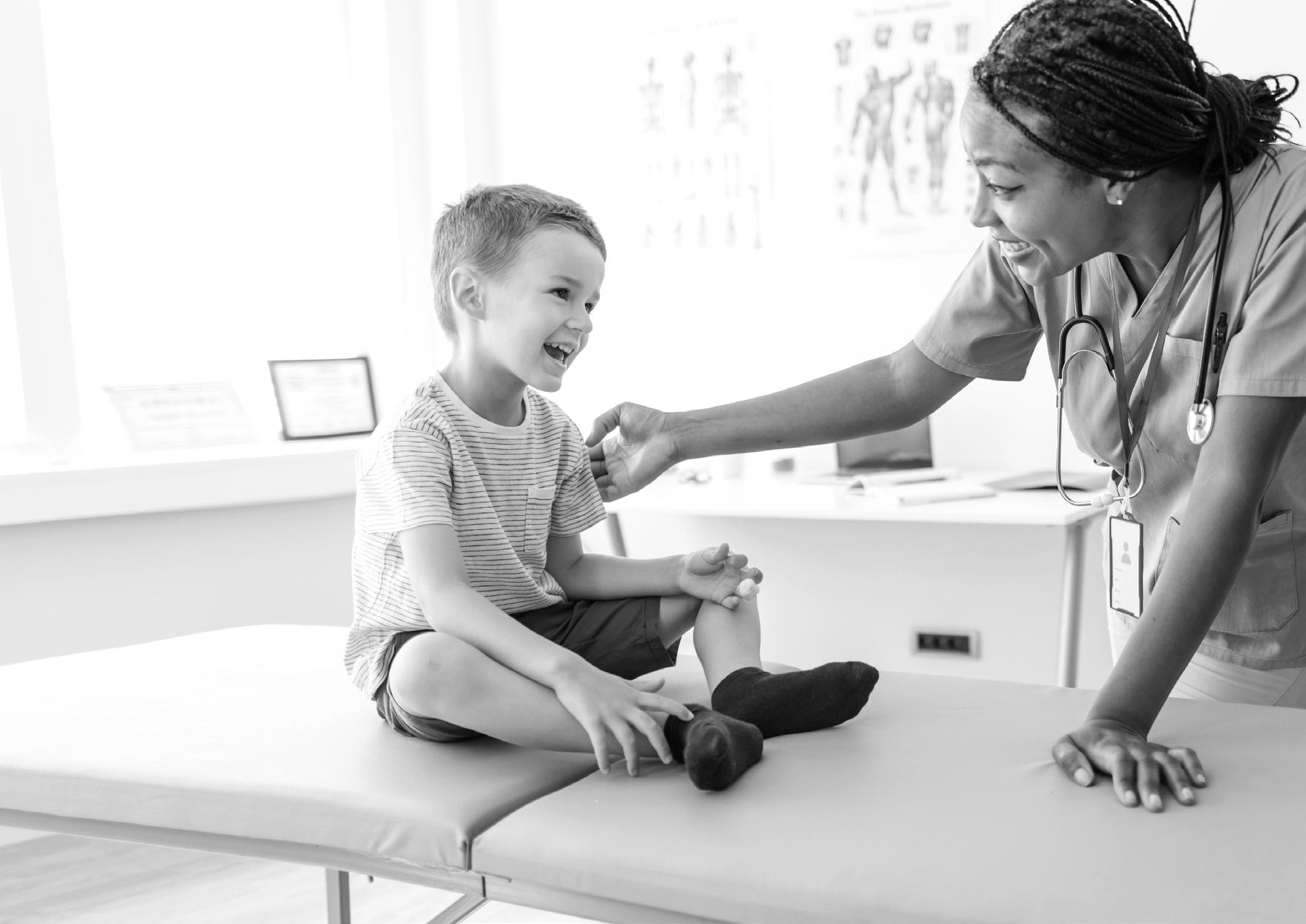 Dr. Charlotte Roberts, Associate Director, Innovation Adoption
Dr. Charlotte Roberts, Associate Director, Innovation Adoption
ADHD is a neurological disorder of the brain that affects behaviour among 5% (1:20) of school aged children. It is a treatable disorder but if left untreated can have significant impact on personal development, mental health, family interaction and academic outcomes.
This national innovation programme aims to improve how ADHD is diagnosed in children and young people. We supported Integrated Care Systems (ICSs) and NHS Trusts in Kent, Surrey and Sussex with their ADHD pathway transformation programmes. Specifically, this programme implemented an objective computer-based assessment, QbTest, developed by health technology company QbTech, into their diagnosis pathways, alongside practitioner clinical assessments. The technology helps inform clinical decisions by measuring the three core components of ADHD: attention, impulsivity, and activity.
Once implemented, the QbTest gives clinicians a better understanding of a patient’s symptoms and potentially speeds up a diagnosis. In March 2023, the National Institute for Clinical Excellence (NICE) published a Medical Innovation Briefing (MIB) highlighting the benefits of objective testing technology (QbTest) when used as part of a comprehensive ADHD assessment.
Key findings included:
� Experts recognise QbTest as an addition to routine clinical assessment of ADHD
� The NICE evidence review and ADHD experts confirm that QbTest helps clinicians make accurate decisions, saving time and money
� NICE reports reduced ADHD waiting lists achieved using QbTest.
To raise awareness of the challenges people living with ADHD face, we developed several videos with children diagnosed with ADHD, their parents and clinicians. These are now being used nationally through NHS Trusts, Qb Tech and the AHSN Network.
You can view the videos on our website.
In partnership with Oxford and Wessex AHSNs, we facilitated nine communities of practice across the southeast and Dorset, which were attended by over 200 professionals. Moving forward, we are looking to pilot QbTest within a Young Offender Institute (YOI) in Medway in partnership with Central North West London NHS Foundation Trust (CNWL), NHSE Health and Justice, and Cookham Wood YOI.
The three year national AHSN Network Focus ADHD programme came to an end in March 2023.
Key metrics for 2022-23:
� We supported six Trusts in Kent and Sussex across 15 sites, including community, paediatric and CAMHS, to provide QbTest as an objective assessment.
� 1,816 children have benefitted since April 2022.
� As a result, there has been a 19% release of clinical time in paediatrics, 9.2% in CAMHS and a reduction of 22% in nurse school observations. (Findings from the National Focus ADHD Evaluation October 2022).
As a Patient Safety Collaborative, we played an important role in the National Patient Safety Improvement Programme (NatPatSIP). This tested and spread effective safety interventions to ensure the NHS will be on a par with the best healthcare services in the world by 2025, with a focus on five areas.
We provided training to 677 care homes and estimate that more than 520 care homes are using tools to help staff manage deteriorating health among residents. The aim is to reduce 999 calls, emergency admissions, and days needed in hospital.
We sought to reduce restrictive practice in inpatient services. A pilot achieved a 15% reduction in traumatising physical restraint, seclusion and rapid tranquillisation, with a mean reduction across all restrictive practice of 61%. We produced a report on the effect of health inequalities in restrictive practice in one of our mental health trusts, which has been presented nationwide.
This programme aims to reduce avoidable medication-related harm, particularly from opioids, and improve the care of people with chronic pain. We worked closely with our ICSs and other stakeholders. In Surrey Heartlands, Royal Surrey Hospital changed its messaging to patients, particularly around discharge to primary care and use of the Discharge Medicines Service. Across England:
� 600,306 people prescribed potentially addictive medicines had received a Structured Medication Review by end Feb 2023
� 80,000 people with chronic pain were referred to a social prescriber in 2022/23
We helped to launch the South East PREM7 preterm optimisation quality improvement project, which supported our nine NHS trusts. This covers five categories: staffing, data capture, resources, staff buy-in, and electronic patient records.
Since launch, each trust has completed audits and is working with MatNeoSIP on projects that include optimal cord management, early breast milk and intrapartum antibiotics. Across KSS, improved collaboration and data analysis ensured more preterm infants had a greater chance of survival with reduced disability.
KSS MatNeoSIP has designed a PREM7+ padlet to support clinicians on each of the interventions – click here to find out more. We are also supporting implementation of two national early warning tools: Maternity Early Warning Score (MEWS) and Neonatal Early Warning Trigger Tool (NEWTT2).
The Patient Safety Incident Response Framework was published in September 2022, marking a shift in NHS response to patient safety incidents and a step towards a safety management system.
With our three ICSs, we have established an advisory group, held workshops and virtual learning events. We collaborated with SE England regional leads to implement this work across KSS, Oxford and Wessex AHSN regions.
“The National Patient Safety Improvement Programmes aim to support and encourage a culture of safety, continuous learning and improvement across the health and care system, helping to reduce the risk of harm and make care safer for all. Across Kent, Surrey & Sussex we have continued to work with our partners in providers trusts and within the ICSs, with a blend of academic innovative thinking, stimulating conversation and meaningful collaboration. Through our work supporting the Patient Safety Incident Response Framework (PSIRF) we are seen as a credible partner and have supported all systems to work synergistically together which has accelerated the opportunities for improvement.”

Ursula Clarke, Associate Director Patient Safety
Asthma affects more than 5.4 million people in the UK. If left uncontrolled, severe asthma, which affects c. 200,000 people, can cause frequent emergency hospital admissions and serious side-effects from extended periods on steroid medication.

As a partner of NHS England’s Accelerated Access Collaborative (AAC), AHSNs have supported the rollout of two innovations to improve asthma pathways
These disrupt pathways causing airway inflammation, helping to manage symptoms and reduce exacerbations. The programme aims to increase patient access to asthma biologics through improved clinical pathways.
Kent, Surrey and Sussex is the only AHSN geography not to have a severe asthma centre (SAC), so patients are referred outside the area to receive treatment. Our work on this programme focused on raising awareness,
referral pathway mapping, sharing national toolkits, and shared- learning support.
� We secured funds from AstraZeneca and GlaxoSmithKline for University Sussex Hospitals NHS Trust to be a Tier 3 centre, which will have significant referral and pathway implications for the area.
� We secured ICS respiratory network commitment to forming working groups to scale up and streamline pathways to ensure sustainability.
� We worked with NHSE specialised commissioning teams to ensure shared care protocols for initiation of biologics for patients from KSS into the relevant SAC.
� We focused on early identification of severe asthma in primary care and onward referrals.
This improves care through faster, more effective diagnosis, alongside a detailed clinical history and other tests. It can monitor response to treatments and avoid misdiagnosis.
As the project draws to a close, we are working with NIOX® Group and Intermedical, suppliers of respiratory diagnostic and monitoring devices. This will ensure the continued provision of FeNO machines across primary care as upskill staff in the use of FeNO.
This programme ended in March 2023; data for April 2021-February 2022 show that 51 devices were spread across the region, benefitting c. 4,000 patients. This helped to prevent c. 1,450 false positive diagnoses, avoiding unnecessary treatment; an equivalent saving of £420,380 in ICS costs a year.
Since January 2022, the AHSN Network has been delivering a Blood Pressure Optimisation (BPO) programme in partnership with NHS England. This aims to optimise clinical care and selfmanagement for people with high blood pressure to prevent the incidence of heart attacks, strokes, and vascular dementia. It extends implementation of the UCLPartners CVD Proactive Care Frameworks to support primary care staff within Primary Care Networks (PCNs).
In Kent, Surrey and Sussex, we are supporting PCNs to identify patients with previously undiagnosed high blood pressure through case finding interventions. We are working with ICSs to identify those PCNs and practices that should be considered a priority in relation to health inequalities.

We held a series of South East CVD education workshops with over 4,000 attendees in 2022/23. We also collaborated with University College London Partners (UCLPartners) to offer primary care implementation support using the UCLPartners CVD Proactive Care Frameworks.
More than half of KSS practices have implemented or adopted UCLP frameworks to risk stratify their patients. Furthermore, we have developed free CVD resources that are available to any organisation in the country from the CVD Central website, which includes patient experience surveys following a blood pressure check. The British Heart Foundation will analyse the data to produce visual reports every quarter at ICB, place, PCN and event levels.
Eating disorders affect 600,000725,000 people in the UK each year. These are associated with high treatment costs and high mortality, with peak onset during adolescence and early adulthood.
FREED is a national programme to support the spread and adoption of the Early Intervention in Eating Disorders model. It supports specialist services to implement an innovative, evidence-based care package for 16 to 25-year-olds with a first episode eating disorder of less than three years’ duration.
With our support, three mental health trusts have adopted FREED, speeding up diagnosis and treatment. Kent and Medway have launched the first enhanced eating disorder service in the country. Ninety patients in KSS have started treatment as part of the FREED pathway.
In partnership with Wessex and Oxford AHSNs, we have led 11 successful FREED communities of practice, attended by 205 professionals, with a webinar reaching more than 90 clinicians.
We have developed videos to capture the experiences of people who have benefitted, sharing these with professionals at learning events and communities of practice meetings, with over 3,700 downloads. You can view the videos here. We have also explored the role of peer support workers (PSW) in eating disorder services.
We also developed a health inequalities toolkit with Unity Insights to better understand the needs of local young people who present with an eating disorder.
In 2023-24, we will work with Wessex AHSN to pilot digital CBT (CREDO) in Kent and Medway and Dorset, in partnership with North East London Foundation NHS Trust and University of Oxford.
“Having KSS AHSN involved has given us access and signposted us to relevant and helpful forums/ meetings to explore, learn and understand from other services and professionals.”
Claire Baxter Mental Health Practitionerand FREED Champion, Surrey and Borders Partnership NHS Foundation Trust
“Having the support of KSS AHSN has been instrumental in mobilising our FREED pathway within our all age eating disorder service.”
SusieGreenwood
and Clinical Lead from the Kent & Medway Eating Disorder Team
Principal Clinical PsychologistHigh cholesterol is a significant risk factor for developing heart and circulatory diseases. In addition to behaviour changes, there are several treatment options as lipid optimisation is an important aspect of cardiovascular disease (CVD) prevention.
An ambition for the AHSN Lipids and FH national programme is to ensure patients are prescribed the most appropriate medicine in a shared decision with their clinicians. The lipid management pathway can be found here.
Lipid management could support better outcomes to the 6.8 million people in England who have CVD.

For our patients with Hypercholesterolaemia (high blood cholesterol) which is a significant risk factor for CVD, the evidence suggests that improving the detection of those with hypercholesterolaemia and ensuring they received effective treatment will have significant benefits.
Our programme takes a population health management (PHM) approach to support ICSs in improving cardiovascular health. This is achieved through data-driven planning and delivery of lipid optimisation care, improving outcomes through engagement, education, resources, support and collaboration.
We run the KSS Lipids Steering Group, which drives the programme to improve patient care and outcomes, with 16 secondary care experts who support and educate primary care.
In July 2022 a KSS Lipid Pathway Feedback Report highlighted five challenging areas, which are now the focus of the Steering Group.
These are referrals, waiting times, education, coding, and workforce/workload.
We host a South East CVD Education Programme (over 4,000 attendees in 2022/23) and run learning webinars; activity includes an Inclisiran webinar recording and Inclisiran resource pack for Primary Care.
We produce a monthly SE ICS/PCN Lipid dashboard for KSS, Oxford, Wessex AHSNs, and share data in a monthly KSS Lipid Data Newsletter. All organisations nationwide can access free resources, including a patient experience survey and Poster.
All KSS practices are adopting the NICE endorsed lipid management pathway and patients are benefiting. We continue to see a significant increase in engagement, and all three KSS ICBs secured InHIP (Innovation for Health Inequalities Programme) funding to focus on lipid optimisation in targeted populations. InHIP is a collaboration between the Accelerated Access Collaboration (AAC), NHS England’s National Healthcare Inequalities Improvement Programme and the AHSN Network.
We continue to see increased prescription rates across HIST, Ezetimibe, PCSK9i, Bempedoic acid and Inclisiran, suggesting more patients have access to the medicines they need.

In England, the NHS primary care system dispenses over 1 billion prescription items every year. As more people live longer with multiple long-term health conditions, the number of medicines they take often increases.
This can create a significant burden for the person trying to manage multiple medicine regimes, and can cause harm in some cases. Problematic polypharmacy adds a cost to the healthcare system and diminishes quality care for the patient.
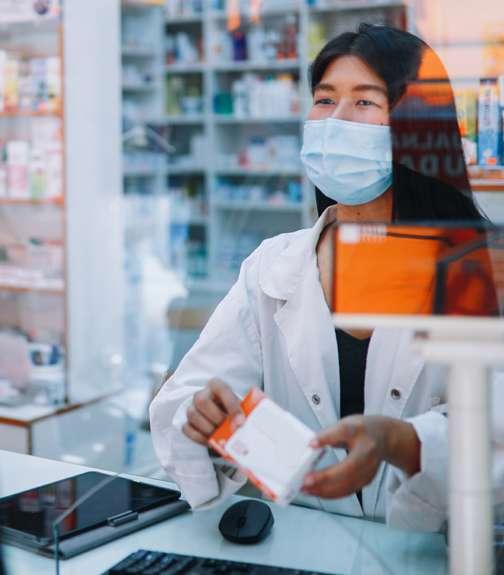
In Kent, Surrey and Sussex, we are working with ICSs and ICBs to deliver the three pillars of the AHSN Network national polypharmacy programme, which are:
Secured attendance from stakeholders at national learning events focusing on using data to understand PCN risks and prioritise patients for a Structured Medication Review. Across KSS, 233 clinicians attended with 53% of PCNs represented; 25% of these were in PCNs identified as deprived.
� Set up and held six ICS-wide multistakeholder Communities of Practice focused on reducing problematic polypharmacy
� Sponsored five local stakeholders to become polypharmacy trainers by attending national evidence-based polypharmacy Action Learning Sets (ALS).
Supported the structured testing of patient behaviour change interventions by PCNs with subsequent evaluation, where Me and My Medicines was selected.
� All three ICSs are actively and positively engaged with the programme, with all elements working towards addressing the system-wide challenges of problematic polypharmacy in their geographies
� Alongside this, the use of Me and My Medicines should enable patients to feel empowered to discuss any issues with, and decisions about, their medicines.
Transforming Wound Care is a new national programme that aims to ensure all patients with lower limb wounds receive evidence-based care.
The programme in its initial phase involves seven AHSNs, including KSS AHSN. Each AHSN is working with at least one Test and Evaluation Site (TES) that intends to focus on lower limb wound care and put into practice the recommendations from the National Wound Care Strategy Programme.
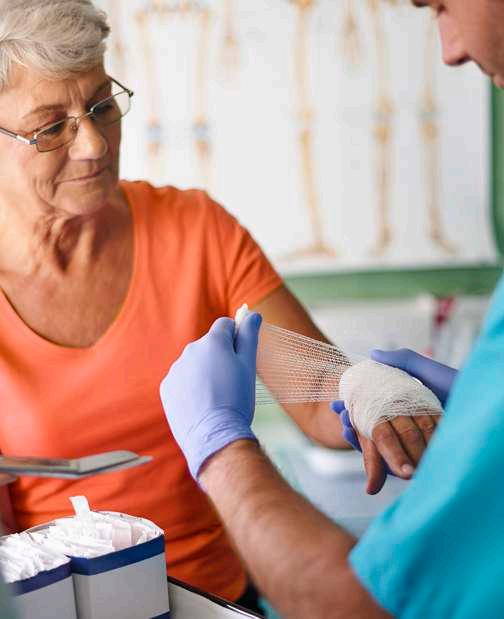
Through evidence-based care, patients could experience faster healing of wounds, an improved quality of life and may be less likely to experience wound reoccurrence. The programme also aims to support the training and development of staff so that they have the capabilities to deliver the required care and seeks to improve the process of collecting data, including exploring the use of digital solutions that support more effective care.
In Kent, Surrey and Sussex, our TES is based at NHS Sussex ICB. We are working with the Community Commissioning team to establish governance that will support the ambition to transform wound care for the people of Sussex. Areas of focus include:
� Clinical pathway development
� Learning and development
� Data, information and digital
� Medicines optimisation.
� Chronic lower limb wounds account for at least 42% of all wounds in the UK, and leg ulcers are the most common type (34% of the total wound population, compared to 7% pressure ulcers and 8% diabetic foot ulcers)
� A large proportion of the resources allocated for wound care is spent on these chronic lower limb wounds because of their slower healing rates. In 2019, there were an estimated 739,000 leg ulcers in England with estimated associated healthcare costs of £3.1 billion.
� Partners across NHS Sussex will be working together and across the wider AHSN Network to demonstrate the programme’s impact, learning from implementation and how health inequalities have been addressed. Next year, we expect to be able to share more information from our TES site.
The MedTech Funding Mandate (MTFM) helps to get selected cost-saving devices, diagnostics and digital products that are approved by National Institute for Health and Care Excellence (NICE) to NHS patients more quickly.

This is a commitment in the NHS Long Term Plan, and a policy that supports technologies that are:
� Effective and improve patient outcomes
� Cost-saving within three years
� Affordable to the NHS.
In 2022-23, two categories of technologies were included in the Mandate.
� Technologies to address benign prostatic hyperplasia (BPH), the medical term used to describe an enlarged prostate. This is currently treated by surgical procedure, which usually requires a hospital stay of up to three days. Four less invasive innovations allow patients with BPH to be treated as day cases.
� Three technologies to improve patient experience during procedures.
In addition, we supported the adoption of technologies approved in the 2021-22 policy and continued as National Product Lead for gammaCore on behalf of the AHSN Network.
We supported ICSs, trusts and suppliers around the uptake and adoption of the four technologies commissioned for BPH: GreenLight XPS, Rezum, PLASMA+ System and UroLift. KSS trusts are offering a selection of technologies in this space and most options exist within an ICS geography for referrals within ICSs.
We have also supported the spread and adoption of technologies to improve patient experience:
Spectra Optia – an apheresis and cell collection platform for people with sickle cell disease who require automated red cell exchange
XprESS Multi Sinus Dilation System – a sterile, single-use device for treating chronic sinusitis with a dilating balloon
Thopaz+ – a portable digital chest drain system, which accurately monitors and records air leak and fluid drainage.
Eleven products on the Mandate are in use across our nine acute trusts, with 50% adoption. There are also 21 business cases at various stages of completion for sign off.

We have made a significant contribution to economic growth through our targeted support of high growth innovators.
This has led to an increase in jobs created and safeguarded, and millions of pounds of public and private investment leveraged for our innovators. We have worked with innovators to develop their products so they are suitable for adoption and spread, and to understand and prove their value. This has been achieved with a focus on health inequalities and the net zero agenda.
351 Total companies supported
These all received our universal advice, guidance, and support offer. Our enhanced offer provided additional practical support to prove value, and in some cases support with real world validation.
Several companies were supported to bring in investment to enable their development and to support pilots, which we brokered.
Our work with innovators in the KSS region has contributed to:
£34m
in economic growth for UK Plc
60.6 jobs created
39.6 jobs safeguarded
Through work funded by the Office for Life Sciences (OLS), we function as an innovation exchange to:
� Identify need and communicate regional priorities
� Signpost and support innovators
� Validate in real-world settings
� Adopt and spread innovations across the system.
Examples of how we have collaborated with other AHSNs include:
� Partnering at regional events, including Bridging The Gap
� Contributing to, and utilising, the AHSN Innovation pipeline for horizon scanning and spread support
� Engaging with the national Commercial Directors Forum and sub-groups.
We have continued to build stronger links between local and national partners, sharing insights and experiences. These include our Applied Research Collaborative (ARC), universities, SBRI, SEHTA, EM3 LEP Set Squared Team, and the Surrey Heartlandsbased Health Technology Accelerator (HTA) Programme. With Unity Insights, we deliver real world validation and health economics activity for our innovators.
“This year we have been delighted to see the growing impact of our approach to our innovation exchange work, both on bringing practical and beneficial solutions to our local system partners, and on the economic growth of the innovators we have supported. We have seen a significant increase in our contribution to the AHSN network economic growth figures. This is testimony to the investment in our industry support offering, focusing our enhanced support offer on high growth companies and on needs articulation that led to us identifying solutions that are matching system partner needs. We have worked closely with many other AHSN s in the network and will continue to collaborate to bring about further impact.”
 Nuala Foley, Associate Director, Commercial and Enterprise
Nuala Foley, Associate Director, Commercial and Enterprise
We work with Integrated Care Systems (ICSs) and local providers to ensure that the existing regional needs are understood and to identify opportunities to better meet these needs, through innovations that can be trusted (are evidenced), are more accessible and more sustainable. We aim to amplify local voices and highlight inequalities on the front line, where the work occurs, and with people who have lived experience. This important concept underpins the methodology of co-design and ensures that challenges to industry and to academia are relevant and based in fact.
Project examples in this area during 2022-23 include:
� Development and delivery of Children and Young People’s Innovation Roadshows

� Primary Care Robotic Process Automation (RPA)
� Horizon scanning activities in partnership with local ICBs to find available innovations to address specific needs.
� Let’s Talk Crawley - The Crawley Programme was established by the West Sussex Health and Care Partnership to improve the health outcomes of the Crawley population by providing health services to the communities of Crawley that will meet their health needs now, and for the future. KSS AHSN worked in partnership with West Sussex CCG to better understand how the people of Crawley think about health services, and about health. Read the full report here.

Signposting and innovator support is often the first contact that an innovator has with our organisation.
This offer includes:
All innovators approaching KSS AHSN were provided with our universal offer of advice, guidance and product feedback. This enabled them to understand the marketplace they were trying to enter, and their business and product development needs. Innovators were also signposted to other sources of support where relevant and encouraged to join our bite-sized workshops, which included topics such as bid writing, regulatory and technical support, legal support, net zero, evaluation planning and value proposition.
For high growth SMEs with solutions matching local or national priorities we provided more support, tailored specifically to their product and business needs. This included focused support around value propositions, bid writing support, investment guidance, and help to identify pilots and, in some cases, into real world validation. With our in-house sustainability lead, innovators were provided support to review their products against net zero and in relevant cases supported to submit funding applications, with success for companies such as Definition Health and The Centre for Sustainable Health Care.
We worked with individual companies on specific projects, which often matched a very distinctive area of need identified by our local partners.
Some examples of this support include:
We supported this company to design and conduct a real-world validation of its digital antenatal education programme.
We provided signposting support and guidance to spread this company’s Razier lifting chair, designed to lift non-injured patients from the ground without the need for an ambulance.
We engaged with other AHSNs through informal working groups with our geographical neighbours, and more formally, e.g., through joint support for SBRI bids with Pinpoint Diagnostics (Yorkshire and Humber and Innovation Agency AHSN’s). We co-led a Southern AHSN industry team to establish closer ways of working to support our missions. We continue to have a representative from KSS AHSN on the network-wide Commercial Directors Forum.
We work in partnership with Unity Insights to provide expertise in the real-world validation of innovators within the NHS. Support for innovators ranges from providing one-off advice and guidance through to validation reports and full validations. Our focus is on high growth SMEs.
Our support focuses on promising or later stage innovations with an apparent existing evidence base, with the aim of increasing flow from real world validation to the spread and adoption support function, and to increase this function’s contribution to economic growth.
Activities include:
� Real-world evaluation
� Validation
� Evaluation planning through our bite-sized workshop delivery
� Advice and guidance: 1:1 support, broad evaluation skills-based workshops and mentoring
� Brokering evaluation pipeline and commercial referral evaluations
Examples of our work in 2022-23 include support for Leo Cancer Care with NHS market awareness and a health economics evaluation to ascertain return on investment to the NHS of purchase of its products. The company makes proton beam therapy devices with a unique upright positioning system.
Building upon the earlier stages of the Innovation Exchange, we support the spread of proven innovations in Kent, Surrey and Sussex, and scaling up regionally and nationally. We focus on supporting high growth potential SMEs within this spread support, seeking to increase contributions to economic growth and to spread the best new innovations.
Activities include:
� Capacity and capability building to support spread and adoption of innovation
� Tailored innovator support by our in-house innovation team
� Primary care innovation sharing
� Influencing and working at ICS (system) and ICP/PCN (place) levels
� General spread support in our region and beyond when innovations fulfil broader system need
� Impact and evaluation.
Examples of our work in 2022-23
We introduced Isla Care, WoundMatrix, Piota, Medefer, ORCHA app libraries, Rehab Guru, Physitrack and other companies and products to clinical settings.
We supported University Hospital Sussex (UH Sussex) to deliver a Digital Fellows programme.
We developed and launched a primary care innovation panel, bringing together professionals and innovators to provide a two-way discussion to explore system needs and potential benefits that can be offered by existing innovations.
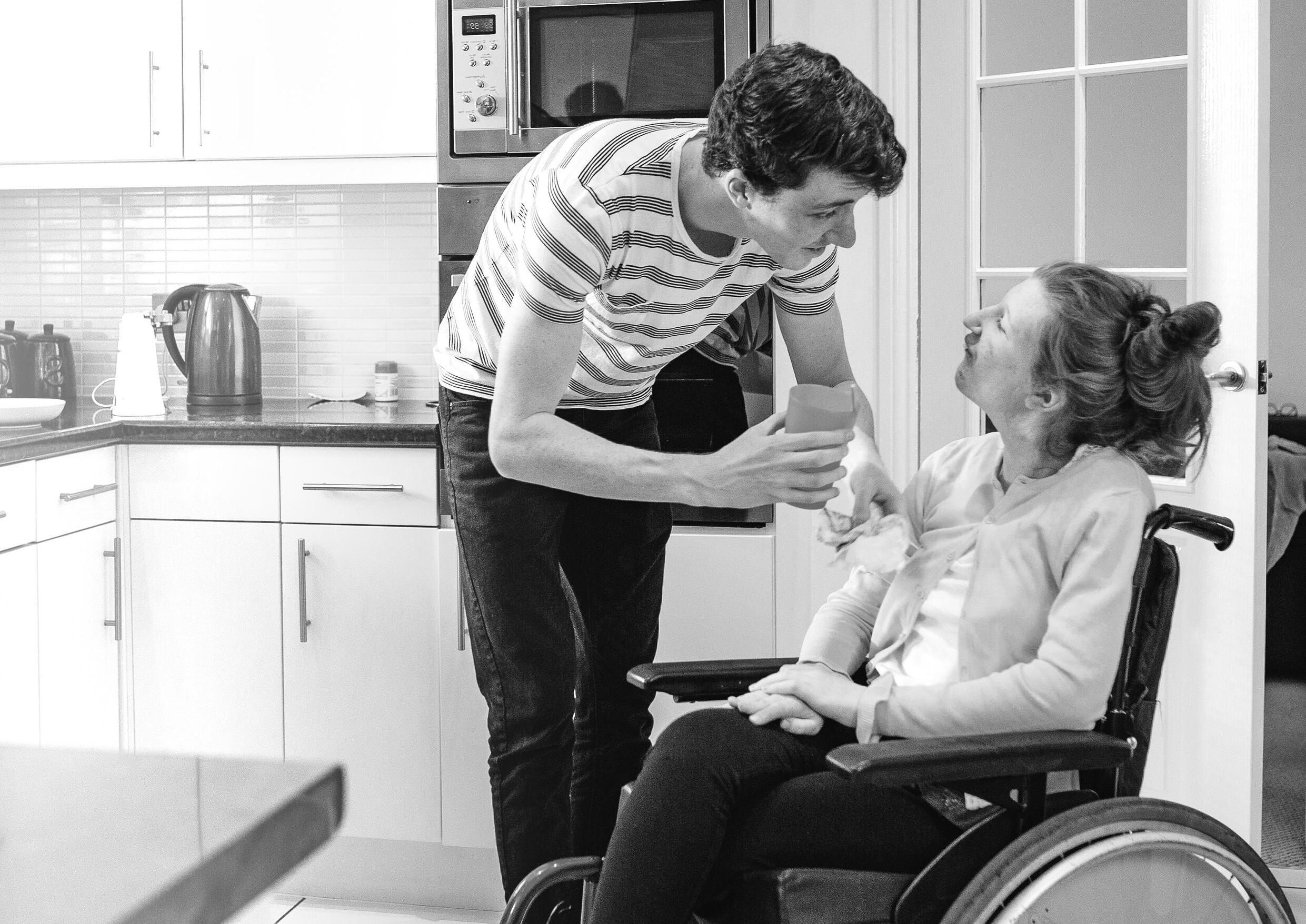
ARC KSS brings together NHS Trusts, local authorities, universities, communities and other partners to develop innovative research to improve health and social care for patients and families in the south east. Our Implementation Leads work across four research themes: dementia, social care, primary and community health, and children and young people’s mental health.
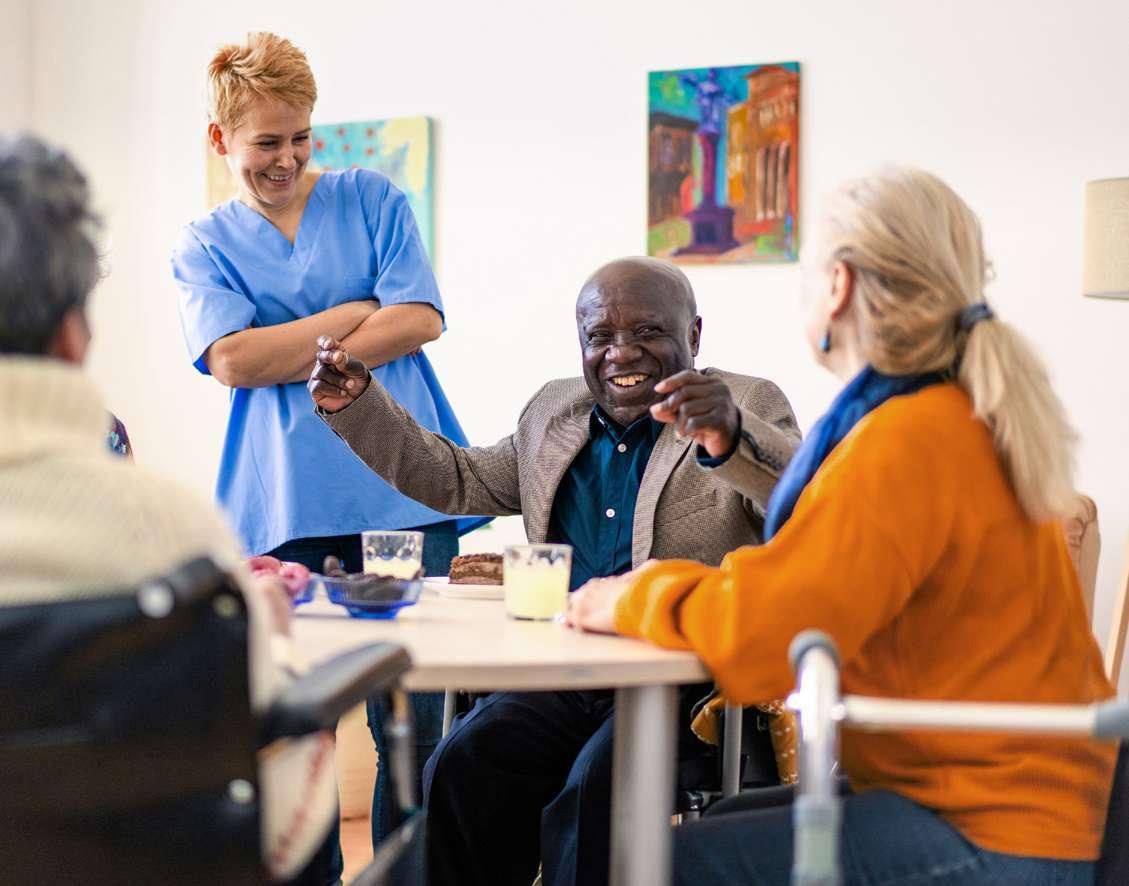
Kent Surry Sussex has the highest proportion of older people and people living with dementia in England, presenting a significant population and health and care challenge.
The objectives of the dementia themes first five-year commission include promoting successful cognitive ageing, improving outcomes following a memory assessment, improving transitions between care (including hospitalisation and avoidance of), and exploiting the potential of technology.
The theme is currently supporting over 20 studies, including several post-doctorate researchers, PhD students, and nationally funded studies in order to meet these objectives. It has attracted funding into the region, including three research posts responding to local dementia priorities such as people living alone and in isolation, and integrated care.
Two studies that demonstrate the approach and impact of the theme in 2022/23 are:
The Kent and Medway Dementia Care Coordinator role has been commissioned by the ICB to standardise care, improve outcomes for people living with dementia and reduce pressure on the health and care system and its workforce. It is an unusual commissioning model that has gained interest nationally, and researchers are helping evaluate this using realist methodology: “what works, for whom, under what circumstances and how”. The early outcomes indicate dementia care coordinators are successfully supporting people with dementia and reducing pressure on other parts of the system, but the demands on dementia care coordinators are significant. This evaluation will help the development of this service and inform future commissioning.
‘My choice’ has been developed in response to consistent feedback from people with dementia saying they either get too much information, or no information on how to live well after their diagnosis - meaning they don’t have the information needed to help them. My choice is a booklet that combines accessible, evidence based, information on how to live well following a diagnosis of dementia, that signposts to trusted resources. It has been co-produced with people with lived experience, and each topic has been reviewed by experts in their field. As a wellrecognised need, there are services regionally and nationally keen to trial and implement the ‘my choice’ booklet, supporting people living with dementia to make decisions that will help them live well, and also to help health and care workers develop evidence based personalised care plans for people living with dementia.
With an ageing population across Kent Surrey and Sussex, and changes in family caring availability, the need and demand for social care is rising. Led by the University of Kent, one of the leading centres for research in Social Care, and working with colleagues across the region and nationally, the aims of the ARC KSS Social Care theme is to consider how changes in practice and service provision can improve the outcomes and care of people supported by social care, their families and carers, as well as those who provide services.
KSS AHSN has been instrumental in supporting the theme with engagement and the development of networks across the sector; and in establishing the priority areas for research and implementation. This has included the development and facilitation of thriving Communities of Practice and ongoing collaborative events to support capacity building, co-design and co-delivery of research and innovation in residential care, homecare provision, supporting the Voluntary, Community and Social Enterprise (VCSE) sector, and to support family and friend or unpaid carers.
We have also supported the scale and spread, and implementation of a number of projects, including:
Evaluating Discharge to Assess (D2A) across Kent, Surrey and Sussex Discharge from hospital continues to be a key area of concern for our three ICSs and we were keen to understand and evaluate the processes in place, and the enablers and barriers to delivering a successful D2A pathway. Working with the research team and Unity Insights, we interviewed staff across secondary care, social care, primary and community health services, and the VCSE sector, as well as analysing the experience of service users and their carers. The evaluation identified three core themes: Commissioning, Multi-disciplinary working and Information and Knowledge Exchange. The team developed a Service Improvement Tool which we have shared with colleagues across health and social care through a series of briefing sessions, and we are continuing to work with partners in order to implement the findings and improve outcomes for service users and their families; and teams working across the discharge pathway.
The CAVEAT toolkit - supporting sustainability of the VCSE sector.
Through research carried out in the early stages of the pandemic, we found out about the extraordinary role the VCSE sector played in supporting the health and wellbeing of older people self-isolating. However, organisations also expressed concerns over future sustainability and how they could demonstrate the impact of their work. As a result, we supported a research project to co-produce the CAVEAT toolkit with the sector. CAVEAT is a free online toolkit, to support the VCSE sector to evaluate their services, measure outcomes and demonstrate impact. The toolkit also offers guidance on the many ways that information can be collected and presented and is particularly useful for an organisation looking to secure on-going and new funding and for quality improvement. It is also a helpful resource for funding bodies and service commissioners. Over 200 colleagues joined us for an online event to introduce the toolkit, and we look forward to seeing the impact that this has had.
For further information, please visit the Social Care and Social Work website.
The ARC KSS PCHS theme recognises that health equity and health disparities are intertwined and that a reduction in health inequalities demonstrates we are moving towards a fairer delivery of care and improved outcomes particularly for those who are seldom heard and disadvantaged.

KSS AHSN helped facilitate a priority setting exercise with citizens from across Kent Surrey and Sussex, using the principles of coproduction. The priorities identified by the public included improving access to services, the adoption of holistic, strength-based approaches to managing illness and distress, and a focus on health creation and prevention at place.
This year PCHS theme outputs have been generative and creative. Working with clinicians, citizens and KSS AHSN, we have evaluated new ways of delivering care, created a primary care innovation panel to showcase and test new ideas, piloted low-cost community-led behavioural interventions to tackle long term conditions (CVD, mental ill health) and are developing asset based approaches to address the prevention agenda.
realist
KSS AHSN worked with Surrey Heartlands ICB and local GPs to acquire funding for a realist evaluation and full-scale implementation of the Fuller Stocktake (2022) Growing Health Together (GHT) pilot in East Surrey.
Fuller (2022) highlighted the need to reform and integrate primary care, to improve outcomes for both our communities, and for those delivering health and social care. The report called for locally-led, nationally-enabled change, and a recognition that one size does not fit all.
Pioneered in one PCN, GHT now extends across five PCNs in Surrey and gives clinicians protected time to work with local citizens to create evidence-based solutions for their own communities, promoting health and wellbeing, and meeting specific local needs. Together, we have established a wrap-around project team, including academics and NHS colleagues, local authorities, the voluntary, community and social enterprise sector, and public health and service users. As a direct result of this work, we have built research capacity and capability in primary care and in local communities.
Due for completion in Q4 2023, the research hopes to capture the ‘active ingredients’ of the GHT ‘ecosystem’ and understand ‘what, works for whom in what context and why’. Project outputs will include a learning framework which KSS AHSN will implement across other KSS PCNs and beyond.
We hope this work will evidence a model of primary care delivery that offers benefits for people, workforce and communities. A model in which we grow healthier together.
With more and more children, young people and their families struggling with their mental health than ever before, the aim of the ARC KSS Starting Well theme is to facilitate and implement research in children and young people’s mental health focusing on severe mental health problems in adolescence and neurodiversity, school based mental health, parenting and seldom heard groups of young people and communities.
We have been instrumental in facilitating the needs articulation of key CYP mental health priorities through communities of practice and identifying research needs across Kent, Surrey and Sussex. For example, bringing together migrants and key stakeholders, to collaborate on research, and securing funding to deliver intercultural training for the KSS workforce working with CYP migrant communities to improve mental health outcomes.
The impact of this work has led to further collaboration on migrant CYP mental health with NHSE and the Office of Health Improvement and Disparities (OHID) through co-produced networking and events. Research and mapping of mental health needs of migrant communities has also been embedded within ICS commissioning specifications.
KSS AHSN has supported the scale and spread of a number of research projects across Kent, Surrey and Sussex including for example: the development of interventions including maternity passports and training for parents with learning disabilities and resources for parents within inpatient settings. We have also developed the whole school and college outcome toolkit based on evidence-based research. As a result, this work has been disseminated nationally in collaboration with NHSE and Department for Education (DfE) and embedded within NHSE National Mental Health Support Team Operating Guidance. The whole school and college outcomes toolkit is being implemented through an online platform for national use.
In response to ARC KSS funded research on the impact of Covid on care leavers, resources and key messages were developed by care leavers which were shared nationally across 88 local authorities. We ran a community of practice, at which 33 pledges by key stakeholders were made. This year we have followed up on the progress made to improve outcomes for care leavers by reviewing the impact that the pledges had made. Examples include; setting up of Facebook peer-to-peer groups and drop-in sessions for care leavers, parent and baby groups for young parent care leavers, peer champion projects and the messages and pledges were embedded within the development of the DfE National Care Review.
“Being part of the research project, I have been able to share my personal experience during the pandemic and in particular how this can impact on asylum young people. I enjoyed presenting to other local authorities to help them think about how to support care leavers.”
Care-experienced young person
“It was just such an interesting piece of work.... I mean a lot of research ends up on shelves and doesn’t go anywhere, but actually it was fundamentally important. The voice of young people was really powerful and that’s the bit that gets me all the time.”
Mark Riddell, Leaving Care National Advisor, Department for Education and co- chair of the workshopsFor further information visit the Starting Well: Children’s Mental Health | ARC KSS website.


We deliver this project in collaboration with British Heart Foundation and NHS Benchmarking.
It uses the Making Every Contact Count approach to understand the impact and outcomes from health checks that detect high risk conditions like atrial fibrillation, raised blood pressure and high cholesterol.
In June 2022 we launched the CVD Central website, providing a variety of resources, including patient experience surveys, patient information and an Inclisiran implementation resource pack to support primary care.
The project supports the national ambition to prevent 150,000 strokes, heart attacks and cases of dementia in the next ten years. It aims to improve health confidence, empower patients with their own data, and feedback patient experience into system improvement to enhance quality.
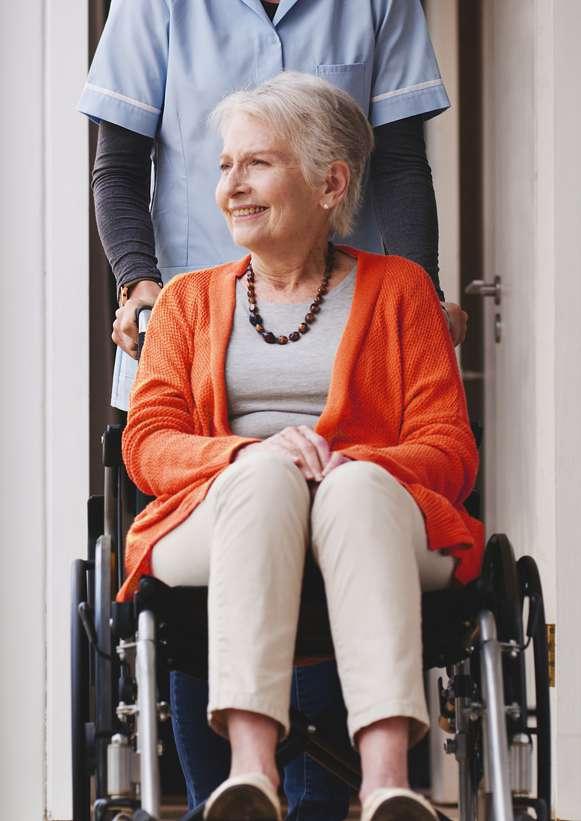
The Topol Programme for Digital Fellowships in Healthcare enables clinical staff to develop specialist digital skills and lead digital transformation. University Hospitals Sussex NHS Foundation Trust recommissioned KSS AHSN to design and deliver a digital fellows programme, building on previous support. We proposed, designed, and delivered an accredited seven-session training programme, which involved nurses, midwives and wider transformation programme teams. The content included: the spread and adoption of innovation, entrepreneurship and innovators, insights, analytics and evaluation, communications and leadership.
We also supported Kent Community Health NHS Foundation Trust to deliver a similar programme to a group of innovation fellows. This was partly in response to the trust’s innovation, quality and people strategies, and the ICS design framework around workforce culture and embedding innovation.
This programme takes data submitted to the National Heart Failure Audit (NHFA) by the South East’s 26 acute trusts and delivers monthly reports to help enhance quality (EQ). It has reported more than 50,000 relevant hospital discharges since April 2015.
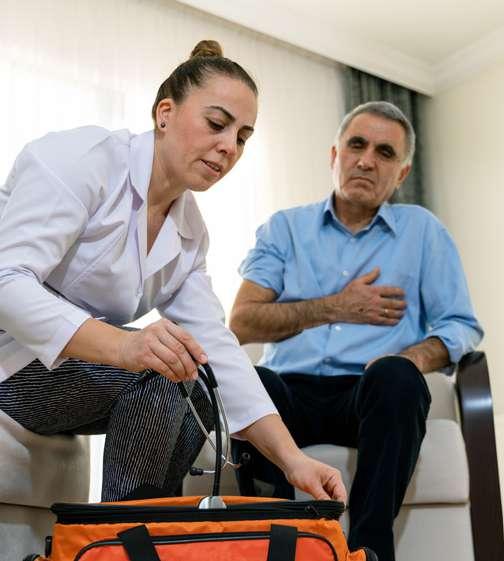
However, we recognise that collecting, presenting, and joining up data is just the start. A culture of regularly accessing and using data for more than performance management is vital to driving improvements in care.
To help build a culture that uses this data to drive care improvements, EQ+ provides insights with data analysis and expert clinical advisors to work closely with clinicians and system leaders. This helps to communicate and visualise data in useful ways for clinicians and commissioners. The EQ+ monthly dashboard delivers monthly reports that measure changes in care quality, provide a benchmark for participating hospitals, and builds a picture of heart failure outside of secondary care.
Programme benefits include:
� Improved business plans and data to support budgeting, workforce planning and delivery
� Real-time evidence of heart failure and outcomes, with no double counting
� Headline outcomes filtered by ICB and trust
� Bespoke view of hospitals’ HF Best Practice Tariff achievement.
Our work connects children and young people digitally to improve mental wellbeing; it includes:
� Research and training facilitation to 200 of the mental health workforce
� A co-produced Mental Health Toolkit
� Two Innovation Roadshows, showcasing how innovation can improve health and care in Surrey
� Co-production of outcome measures and a self-assessment tool with schools and pupils across southeast and east of England, in partnership with SPFT, Charlie Waller Trust and University of Sussex
� A Sussex Youth Summit, with Sussex ICB and Sussex Partnership Foundation NHS Trust, to develop ambitions for the 16-25 youth pathway.
Nationally we led on the evaluation and implementation of the Mental Health Implementation Network national programme on parent-led CBT.
This was the final year of our respiratory activity; we have handed over to our ICB Respiratory Network partners to lead and embed their local priorities.
The KSS Respiratory Programme started in 2014, with the aims of working collaboratively to improve service quality, and to adopt and spread innovation. The KSS Respiratory Network grew to more than 800 members across the region.
In 2022/23, we held the final KSS Pulmonary Rehabilitation (PR) Network and Oxygen & Respiratory Failure Clinical Network meetings. Both provided peer support, access to clinical leadership, and a way to engage with innovation and research opportunities. We continued to produce the Breathing Matters e-newsletter and hosted bi-annual Respiratory Collaborative events.
We would like to thank Dr Jo Congleton and Julia Bott for their excellent clinical leadership over many years, and our network members for their engagement and hard work.
Medical education continues to use paper in a digital world; SimEPR addresses the ‘digital gap’ in training by creating an experience that is more representative of clinical practice. It equips future clinicians with the skills to use electronic patient records safely to optimise patient outcomes.

SimEPR was developed by Dr Arron Thind, a GP trainee; KSS AHSN provided peer support through our Innovation Leads Network, and facilitated introductions to medical schools.
Across four pilot medical simulation centres, 166 medical students/junior doctors had used SimEPR up to December 2022. Of these: 86% reported a more realistic training experience, 82% said it augmented their clinical learning, and 86% would recommend it.
The World Health Organisation estimates that 30-50% of patients do not take medicines according to prescription and information instructions. Nevertheless, the way medicines are labelled has not changed substantially for decades. We have worked with Unity Insights, NIHR ARC KSS, National Innovation Centre for Ageing, VOICE, and Pfizer to investigate this issue. What do patients, carers, and others think about this issue? Could it be improved using digital technology?
After extensive engagement (3,000 responses), the partners published ‘One Size Doesn’t Fit All: reimagining medicines information for patients’ in December 2022. This found a need for change to improve product information using digital tools, with the aim of helping more people to take their medicines correctly and improve health outcomes. It proposed work in three areas to develop a UK roadmap for electronic product information (ePI).
The Digital Inclusion Framework for health and care was developed in response to a request from NHS Sussex, to KSS AHSN, to look at their remote monitoring programmes from a digital inclusion lens.
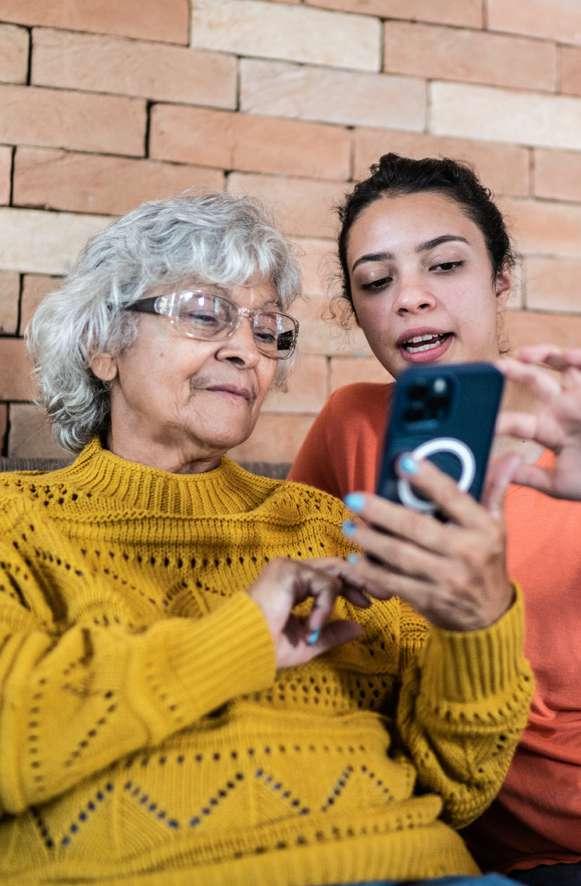
This resulted in a collaboration between NHS Sussex, the University of Sussex and KSS AHSN that co-developed an evidence-based framework that looks holistically at barriers and enablers to digital inclusion in health and care, and is supported by an assessment tool, and other resources for implementation.
To date, at ICB level, it is being used alongside equality health impact assessments (EHIA), it will be included in its commissioning cycle training, it is informing digital strategy for both the ICB and its providers, and a commitment to optimise and embed its use is in its delivery plan. KSS AHSN has used the framework across the region to inform its digital fellowship training programmes, and in health and care provider and education events associated with digital inclusion and inequalities.
Alongside University of Sussex, we are also working with industry to explore how learnings from the framework can be used to support the development of more inclusive technologies. At an NHSE level, the framework has been presented to national and regional population health, virtual health and digital teams, with discussions to date on how this work could help inform national strategy and its extended use in programmes such as virtual wards.
An evaluation of the frameworks use is underway, and this will inform further development and support implementation in wider use settings. KSS AHSN continues to work with NHS Sussex and the University of Sussex, and where applicable NHSE to optimise the use of this framework and associated tools to reduce inequalities.
Our national work Office for Life Sciences
More than a year after opening, the HTA has engaged with industry, academia, and clinicians, resulting in a pipeline of activity that fits the needs of the system and innovators.
It has undertaken 90 engagements, with 42 tracked as potential projects and 23 transferred into the project pipeline at different stages of development.
These projects include:
� Testing the usability of a remote monitoring app to keep patients safe at home
� Identifying, shortlisting, and testing selfmanagement tools for people with mental health problems
� An ethical approval process for an exercise technology, which will allow for safe and effective discharge from hospital post lower limb surgery
� Supporting focus groups that explore public perceptions of tracking devices in hospitals to reduce the risk of hospital acquired infections spreading.

The HTA continues to reflect Surrey needs and priorities, factoring in the ‘Surrey Critical 5’:
1 Keeping people well
2 Safe and effective discharge
3 High-risk care management
4 Effective hospital management
5 Surrey Heartlands-wide efficiencies